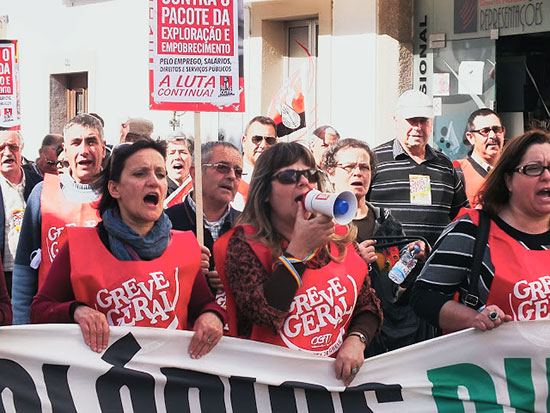Portugal general strike confronts austerity
By
John Catalinotto
Published Apr 1, 2012 10:21 PM
|
Portugal’s strikers march
in Evora: ‘No to the
package of austerity
and impoverishment.’
Photo: PCP
|
Center stage for the class struggle in Europe moved from Greece to the Iberian Peninsula as March was ending. A successful general strike in Portugal on March 22 “showed the strength and determination of workers to continue the struggle against the ‘package’ that increases exploitation and impoverishment, and for defense of workers’ rights and the future of Portugal,” according to the major CGTP-IN labor confederation. (cgtp-in.pt, March 23)
The package is a new collection of labor laws that extends the weekly working hours, makes it easier to carry out layoffs, weakens the union side in collective bargaining, increases unemployment, job insecurity, wage and pension cuts, deterioration of working and social conditions, and is a huge step backwards for workers.
Last year, a coalition of right-wing parties took over the parliamentary government. The package, however, was also supported by the Socialist Party, considered the electoral “left,” along with the more right-wing parties. Only the Communist Party and the Left Block rejected the package.
As in Greece, the local Portuguese ruling class — with the support and under the pressure of the European Union, the European Central Bank and the International Monetary Fund — called the Troika — is attempting to impose this package as part of a general austerity on the Portuguese workers.
The March 22 general strike is the latest of a series of strikes and mass demonstrations resisting the austerity that have involved as many as 3 million of Portugal’s 11 million people.
Most of the European working class is suffering from the economic crisis. Official unemployment in Portugal is bad enough, at nearly 15 percent. In Spain it is over 23 percent.
General strike in the Spanish state
In Spain, Portugal’s neighbor, the rightist-led government is also attempting to reduce workers’ rights through a so-called Labor Reform. The so-called Socialists (PSOE) also pushed concessions on the workers when they led the government until last year and also support the “reforms.” During that time, the leadership of the union confederations (UGT and CCOO) that supported the “left” government signed onto an agreement that avoided strikes.
There was one general strike called on Sept. 29, 2010. The union leadership only partially mobilized support for it. Between that time and now, the only successful general strikes have been in the Basque Country and in Galicia. These are areas where labor militancy combines with the movement for national demands against the centralized Spanish state, and where the unions have a distinctly different leadership than in the federal unions.
In that time period, there has also been an upsurge of struggle from the “Indignant ones.” Young people, facing at least 45 percent unemployment rates and unable to even begin adult life, took over the central squares of dozens of cities last spring.
For March 29, the UGT and CCOO have called a general strike. While there is skepticism about the union leadership, most Spanish progressive activists will be participating in and trying to build the strength of the strike, as will the most militant rank-and-file workers. Some may be doing this even while they are contesting the role of the leadership.
Meanwhile, the assault on the Greek workers continues unabated, and, as rallies in solidarity with the Greek people have shown, in more and more countries throughout Europe the working class is becoming conscious that they are under a general attack by the European bankers and business class — who have the backing of Wall Street. A united fightback is required.
<
Articles copyright 1995-2012 Workers World.
Verbatim copying and distribution of this entire article is permitted in any medium without royalty provided this notice is preserved.
Workers World, 55 W. 17 St., NY, NY 10011
Email:
[email protected]
Subscribe
[email protected]
Support independent news
DONATE


